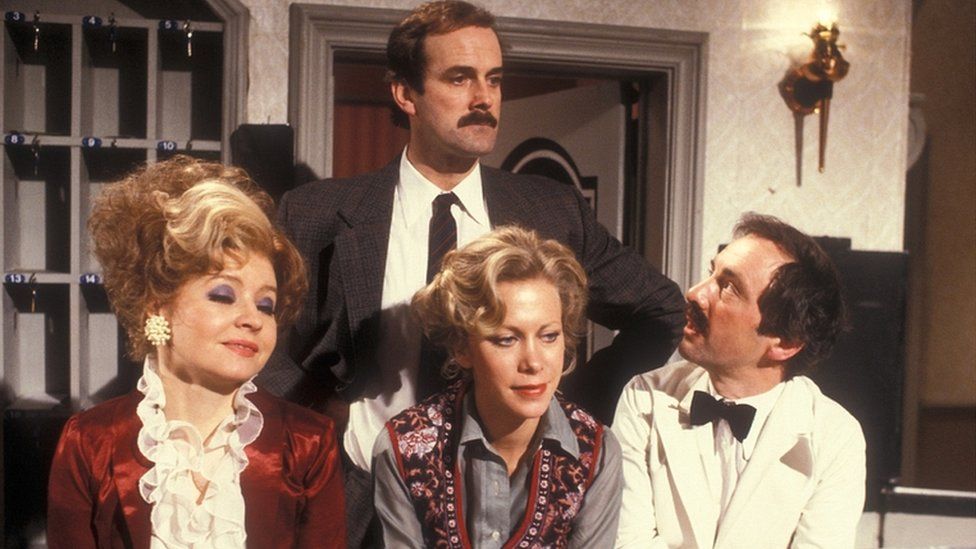Japan turns to Basil Fawlty in race for Olympic English
- Published

Japan is struggling to make sure it has enough proficient English speakers when it hosts the Tokyo Olympic and Paralympic Games in 2020.
And the classic BBC comedy series Fawlty Towers is being deployed by some teachers in an attempt to give Japanese students an example of spoken English - rather than focusing on written language and grammar.
Japan's government and businesses want to use the Olympics to boost tourism and global trade and to present a positive image of Japan to the world.
So the government needs to ensure a supply of English speakers to be Olympic volunteers and work in the accommodation, tourism, and retail industries.
There is also a demand for professionals, such as doctors and nurses, to speak to visitors or competitors in English.
Japan's government has been working to bridge this English language gap.
The subject is now taught in school from when students are eight or nine years old and remains compulsory for the next seven years.
University students and school teachers have been sent on trips abroad to learn English, and many universities are giving language lessons to prospective Olympic volunteers.
There are even proposals to create an "English village" in Tokyo, populated entirely by English-speakers, where learners could immerse themselves in the language.
But early indications are that progress has been slow, and the country still comes surprisingly far down global rankings of English proficiency.
More stories from the BBC's Global education series looking at education from an international perspective, and how to get in touch.
You can join the debate at the BBC's Family & Education News Facebook page.
Japan is 40th out of 48 countries on the Test of English for International Communication (TOEIC), and last year it fell from "moderate proficiency" to "low proficiency" on EF's English Proficiency Index.
So why is learning English so difficult for the Japanese?
Megumi Tada, an education expert at Hirosaki University, said the main reason is "the lack of teachers who can effectively use the language".
When the Kyoto Board of Education asked middle school English teachers to take the TOEIC, fewer than one in four teachers reached the threshold for language skills good enough for most social demands and limited work requirements.
Ms Tada said that although the government has now introduced English in primary schools, most of the teachers in these schools are not qualified to teach the language.
She said a better way to improve English teaching would be to increase the number of trained teachers in primary and secondary schools, and to train them for longer.
There are also questions about the way English is taught in schools. The focus tends to be on grammar, vocabulary and writing, which are repeatedly tested in high-pressure exams.
As a result, English is rarely spoken in Japanese classrooms.
Junnosuke Nakamura, who leads the education company EF in Japan, has said that "too often in our schools, a Japanese national is teaching English in Japanese, and English must be taught in English".
He said the government's reforms "have not actually changed anything at a fundamental level".
Helen Bentley, from communications firm Finsbury, worked on Tokyo's Olympic bid.
"There are relatively few opportunities to use spoken English in Japan," she said.
"As a result, many Japanese are much stronger at reading and writing than they are at speaking."
There are teachers trying a more imaginative approach to getting students to speak English - such as setting them comedies to watch for homework.
Teachers in Fukuoka Prefecture have been using Fawlty Towers and Red Dwarf to get students used to hearing spoken English.
It raises the prospect of a generation of Japanese students sounding like Basil, Sybil or even Manuel.
There is also a barrier from a culture of perfectionism in Japanese education, with a belief that there is a "right" way to do something.
Students do not want to make mistakes and they will not attempt something until they are sure they can get it right.
This might be a good thing for literacy and numeracy - Japan comes consistently near the top of global rankings such as PISA.
But it does not work so well for languages, for which speaking and making mistakes are crucial to learning.
Fumiko Inoue, who lectures in Japanese language and cross-cultural management at Rotterdam Business School, pointed to the experience of one of her Dutch students who taught English in a school in Tokyo.
At first, the new teacher was surprised that students were reluctant to speak English in class, but after a lot of encouragement she got them to chat to each other in the language.
That is, until she was observed by a senior teacher who criticised her students for making too many grammatical mistakes.
"If you don't say anything, you don't make any mistakes either, of course," said Prof Inoue.
This teaching style can have lifelong effects on how Japanese people approach the English language.
"We Japanese have a strong psychological barrier to speaking English," said Kumiko Iwasaki, a professor of psychology and education at the Open University of Japan.
"We have an obsession that we have to speak English perfectly."